Analysis of Management Styles, Leadership, and Communication
VerifiedAdded on 2020/06/04
|11
|2406
|70
Report
AI Summary
This report provides a comprehensive analysis of management practices within the Hilton Hotel. It explores various management styles such as autocratic, democratic, and laissez-faire, and their impact on the hotel's operations. The report delves into leadership characteristics, communication processes, and organizational culture, highlighting their significance in achieving desired outcomes. It includes a SWOT analysis of the author's personal management skills and outlines SMART objectives for professional development. Furthermore, the report examines strategies for leading and motivating teams, along with managerial decisions that support the accomplishment of organizational goals. The conclusion summarizes the key findings and emphasizes the importance of effective management in driving business success, supported by references to relevant academic literature.
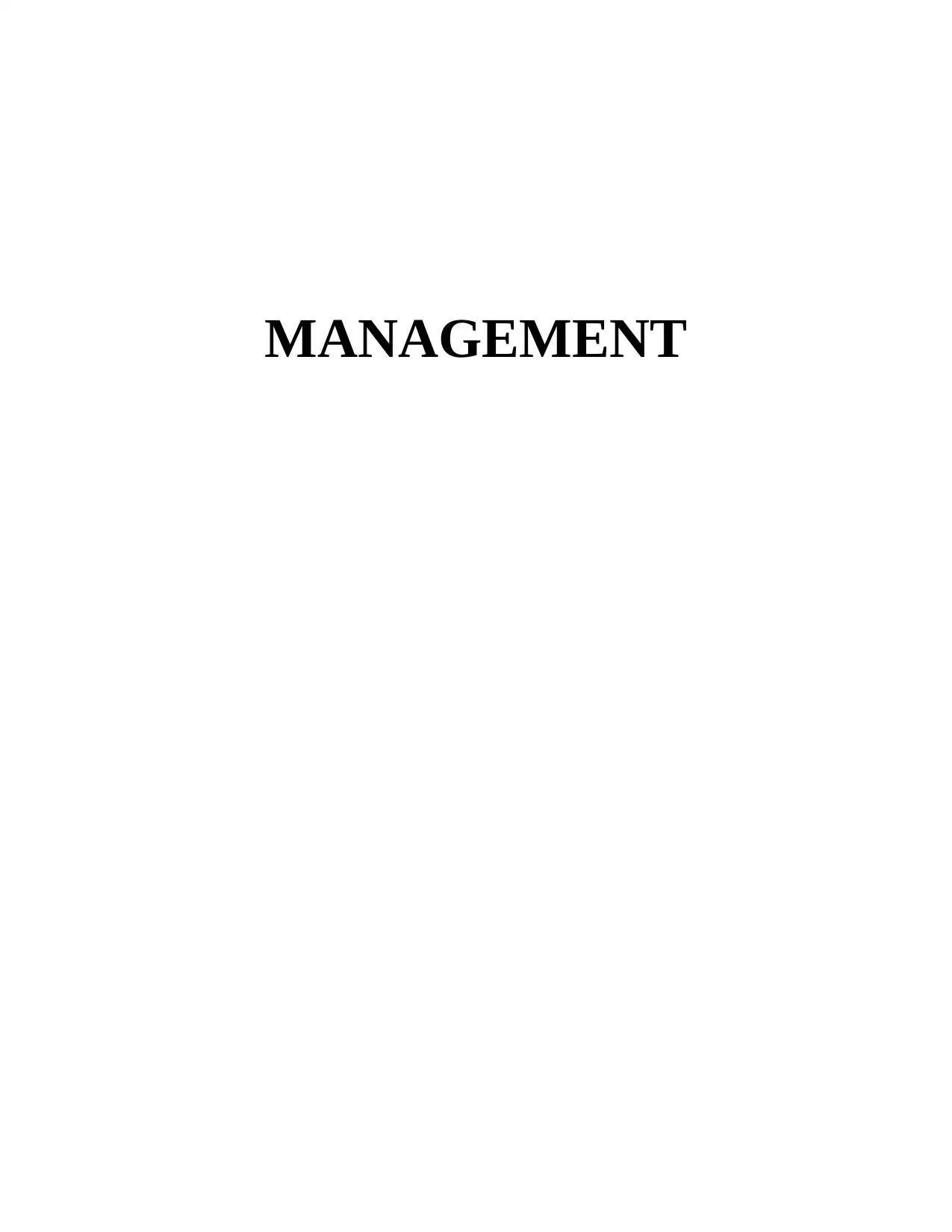
MANAGEMENT
Paraphrase This Document
Need a fresh take? Get an instant paraphrase of this document with our AI Paraphraser
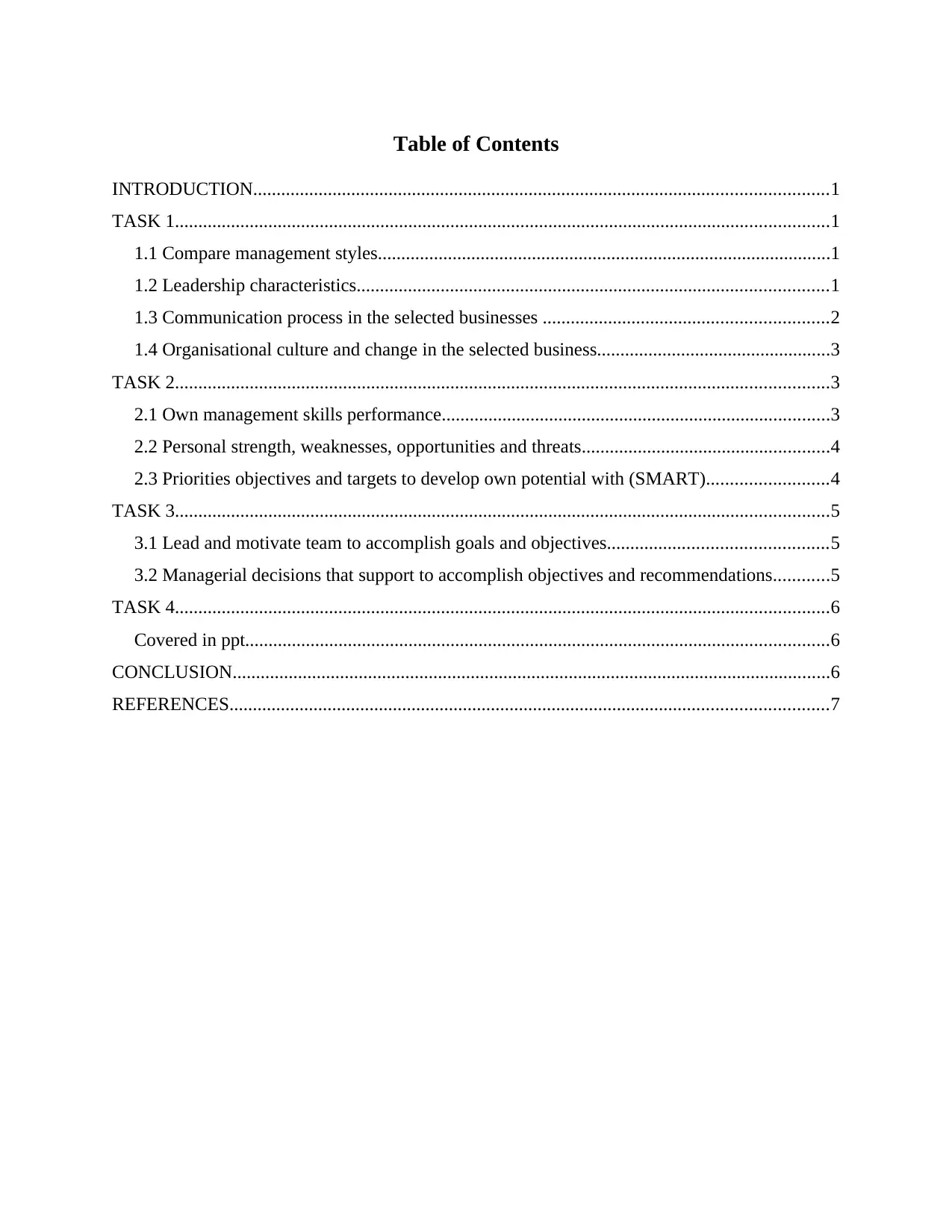
Table of Contents
INTRODUCTION...........................................................................................................................1
TASK 1............................................................................................................................................1
1.1 Compare management styles.................................................................................................1
1.2 Leadership characteristics.....................................................................................................1
1.3 Communication process in the selected businesses .............................................................2
1.4 Organisational culture and change in the selected business..................................................3
TASK 2............................................................................................................................................3
2.1 Own management skills performance...................................................................................3
2.2 Personal strength, weaknesses, opportunities and threats.....................................................4
2.3 Priorities objectives and targets to develop own potential with (SMART)..........................4
TASK 3............................................................................................................................................5
3.1 Lead and motivate team to accomplish goals and objectives...............................................5
3.2 Managerial decisions that support to accomplish objectives and recommendations............5
TASK 4............................................................................................................................................6
Covered in ppt.............................................................................................................................6
CONCLUSION................................................................................................................................6
REFERENCES................................................................................................................................7
INTRODUCTION...........................................................................................................................1
TASK 1............................................................................................................................................1
1.1 Compare management styles.................................................................................................1
1.2 Leadership characteristics.....................................................................................................1
1.3 Communication process in the selected businesses .............................................................2
1.4 Organisational culture and change in the selected business..................................................3
TASK 2............................................................................................................................................3
2.1 Own management skills performance...................................................................................3
2.2 Personal strength, weaknesses, opportunities and threats.....................................................4
2.3 Priorities objectives and targets to develop own potential with (SMART)..........................4
TASK 3............................................................................................................................................5
3.1 Lead and motivate team to accomplish goals and objectives...............................................5
3.2 Managerial decisions that support to accomplish objectives and recommendations............5
TASK 4............................................................................................................................................6
Covered in ppt.............................................................................................................................6
CONCLUSION................................................................................................................................6
REFERENCES................................................................................................................................7

⊘ This is a preview!⊘
Do you want full access?
Subscribe today to unlock all pages.

Trusted by 1+ million students worldwide
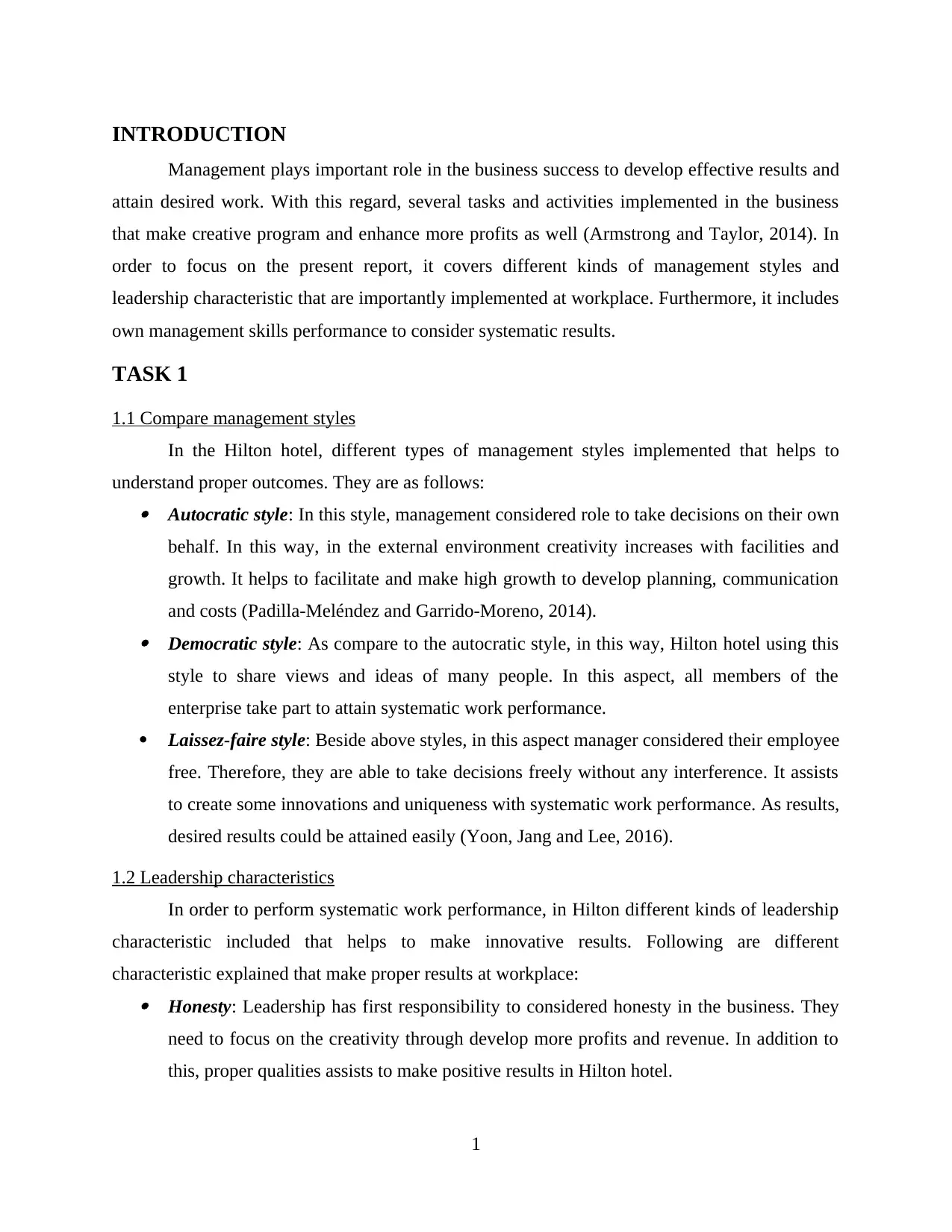
INTRODUCTION
Management plays important role in the business success to develop effective results and
attain desired work. With this regard, several tasks and activities implemented in the business
that make creative program and enhance more profits as well (Armstrong and Taylor, 2014). In
order to focus on the present report, it covers different kinds of management styles and
leadership characteristic that are importantly implemented at workplace. Furthermore, it includes
own management skills performance to consider systematic results.
TASK 1
1.1 Compare management styles
In the Hilton hotel, different types of management styles implemented that helps to
understand proper outcomes. They are as follows: Autocratic style: In this style, management considered role to take decisions on their own
behalf. In this way, in the external environment creativity increases with facilities and
growth. It helps to facilitate and make high growth to develop planning, communication
and costs (Padilla-Meléndez and Garrido-Moreno, 2014). Democratic style: As compare to the autocratic style, in this way, Hilton hotel using this
style to share views and ideas of many people. In this aspect, all members of the
enterprise take part to attain systematic work performance.
Laissez-faire style: Beside above styles, in this aspect manager considered their employee
free. Therefore, they are able to take decisions freely without any interference. It assists
to create some innovations and uniqueness with systematic work performance. As results,
desired results could be attained easily (Yoon, Jang and Lee, 2016).
1.2 Leadership characteristics
In order to perform systematic work performance, in Hilton different kinds of leadership
characteristic included that helps to make innovative results. Following are different
characteristic explained that make proper results at workplace: Honesty: Leadership has first responsibility to considered honesty in the business. They
need to focus on the creativity through develop more profits and revenue. In addition to
this, proper qualities assists to make positive results in Hilton hotel.
1
Management plays important role in the business success to develop effective results and
attain desired work. With this regard, several tasks and activities implemented in the business
that make creative program and enhance more profits as well (Armstrong and Taylor, 2014). In
order to focus on the present report, it covers different kinds of management styles and
leadership characteristic that are importantly implemented at workplace. Furthermore, it includes
own management skills performance to consider systematic results.
TASK 1
1.1 Compare management styles
In the Hilton hotel, different types of management styles implemented that helps to
understand proper outcomes. They are as follows: Autocratic style: In this style, management considered role to take decisions on their own
behalf. In this way, in the external environment creativity increases with facilities and
growth. It helps to facilitate and make high growth to develop planning, communication
and costs (Padilla-Meléndez and Garrido-Moreno, 2014). Democratic style: As compare to the autocratic style, in this way, Hilton hotel using this
style to share views and ideas of many people. In this aspect, all members of the
enterprise take part to attain systematic work performance.
Laissez-faire style: Beside above styles, in this aspect manager considered their employee
free. Therefore, they are able to take decisions freely without any interference. It assists
to create some innovations and uniqueness with systematic work performance. As results,
desired results could be attained easily (Yoon, Jang and Lee, 2016).
1.2 Leadership characteristics
In order to perform systematic work performance, in Hilton different kinds of leadership
characteristic included that helps to make innovative results. Following are different
characteristic explained that make proper results at workplace: Honesty: Leadership has first responsibility to considered honesty in the business. They
need to focus on the creativity through develop more profits and revenue. In addition to
this, proper qualities assists to make positive results in Hilton hotel.
1
Paraphrase This Document
Need a fresh take? Get an instant paraphrase of this document with our AI Paraphraser
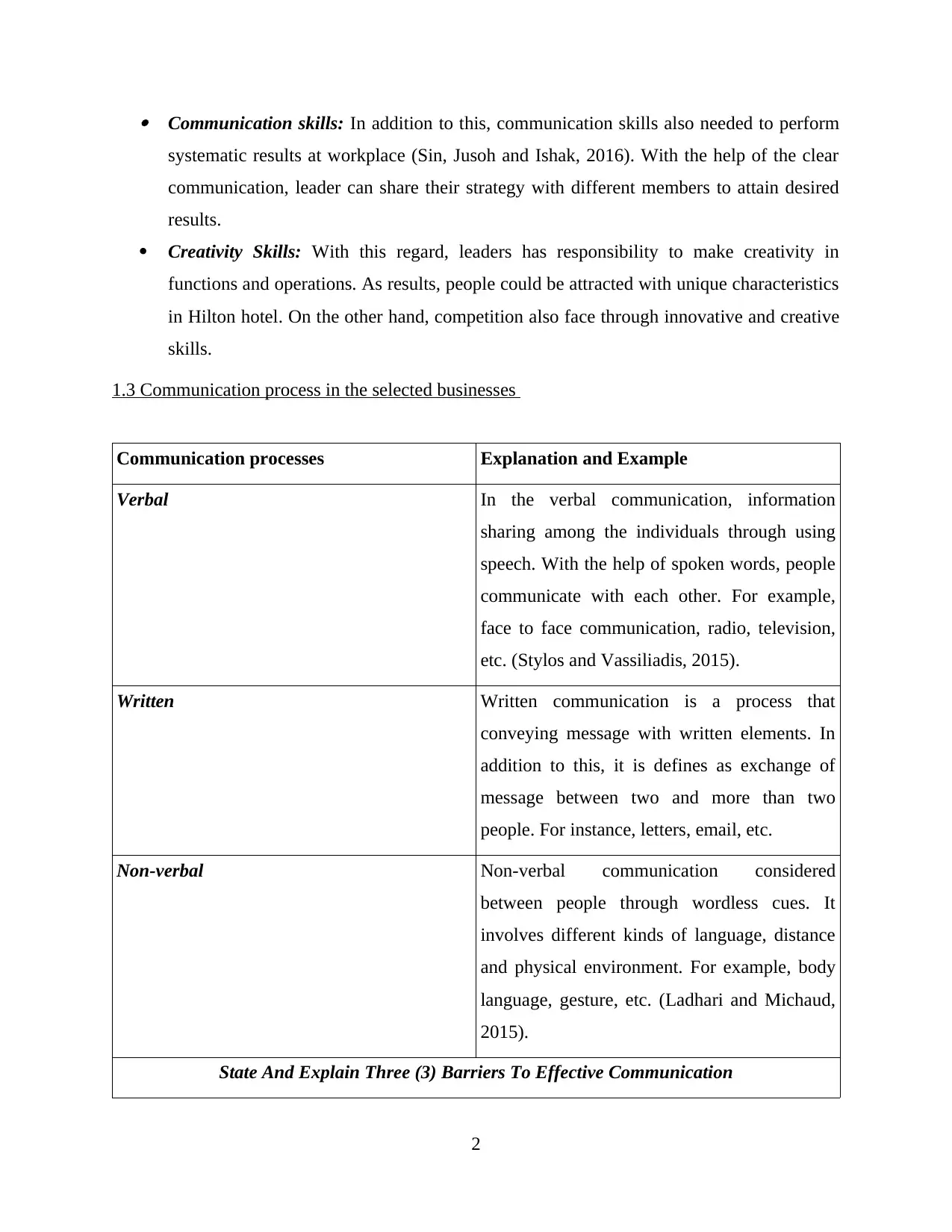
Communication skills: In addition to this, communication skills also needed to perform
systematic results at workplace (Sin, Jusoh and Ishak, 2016). With the help of the clear
communication, leader can share their strategy with different members to attain desired
results.
Creativity Skills: With this regard, leaders has responsibility to make creativity in
functions and operations. As results, people could be attracted with unique characteristics
in Hilton hotel. On the other hand, competition also face through innovative and creative
skills.
1.3 Communication process in the selected businesses
Communication processes Explanation and Example
Verbal In the verbal communication, information
sharing among the individuals through using
speech. With the help of spoken words, people
communicate with each other. For example,
face to face communication, radio, television,
etc. (Stylos and Vassiliadis, 2015).
Written Written communication is a process that
conveying message with written elements. In
addition to this, it is defines as exchange of
message between two and more than two
people. For instance, letters, email, etc.
Non-verbal Non-verbal communication considered
between people through wordless cues. It
involves different kinds of language, distance
and physical environment. For example, body
language, gesture, etc. (Ladhari and Michaud,
2015).
State And Explain Three (3) Barriers To Effective Communication
2
systematic results at workplace (Sin, Jusoh and Ishak, 2016). With the help of the clear
communication, leader can share their strategy with different members to attain desired
results.
Creativity Skills: With this regard, leaders has responsibility to make creativity in
functions and operations. As results, people could be attracted with unique characteristics
in Hilton hotel. On the other hand, competition also face through innovative and creative
skills.
1.3 Communication process in the selected businesses
Communication processes Explanation and Example
Verbal In the verbal communication, information
sharing among the individuals through using
speech. With the help of spoken words, people
communicate with each other. For example,
face to face communication, radio, television,
etc. (Stylos and Vassiliadis, 2015).
Written Written communication is a process that
conveying message with written elements. In
addition to this, it is defines as exchange of
message between two and more than two
people. For instance, letters, email, etc.
Non-verbal Non-verbal communication considered
between people through wordless cues. It
involves different kinds of language, distance
and physical environment. For example, body
language, gesture, etc. (Ladhari and Michaud,
2015).
State And Explain Three (3) Barriers To Effective Communication
2
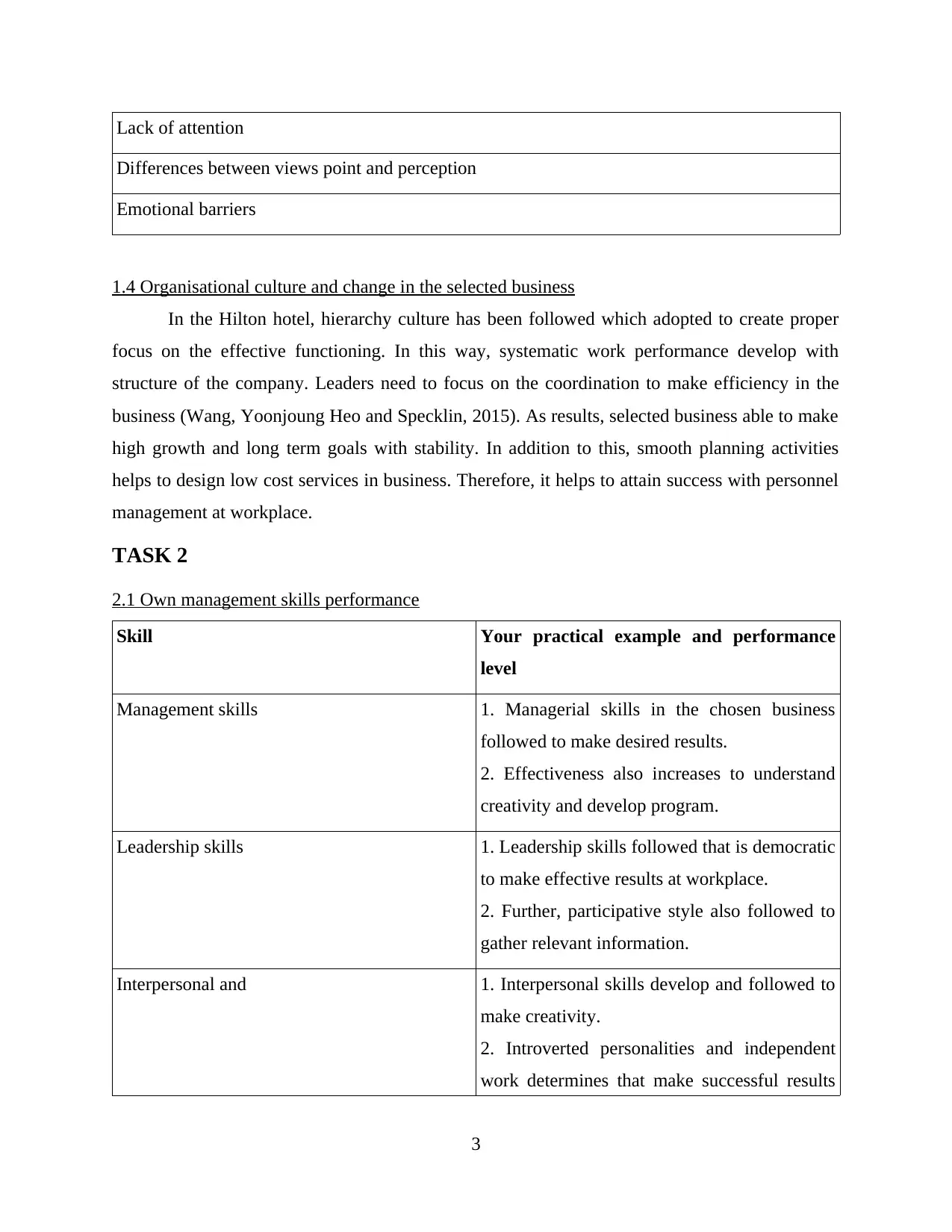
Lack of attention
Differences between views point and perception
Emotional barriers
1.4 Organisational culture and change in the selected business
In the Hilton hotel, hierarchy culture has been followed which adopted to create proper
focus on the effective functioning. In this way, systematic work performance develop with
structure of the company. Leaders need to focus on the coordination to make efficiency in the
business (Wang, Yoonjoung Heo and Specklin, 2015). As results, selected business able to make
high growth and long term goals with stability. In addition to this, smooth planning activities
helps to design low cost services in business. Therefore, it helps to attain success with personnel
management at workplace.
TASK 2
2.1 Own management skills performance
Skill Your practical example and performance
level
Management skills 1. Managerial skills in the chosen business
followed to make desired results.
2. Effectiveness also increases to understand
creativity and develop program.
Leadership skills 1. Leadership skills followed that is democratic
to make effective results at workplace.
2. Further, participative style also followed to
gather relevant information.
Interpersonal and 1. Interpersonal skills develop and followed to
make creativity.
2. Introverted personalities and independent
work determines that make successful results
3
Differences between views point and perception
Emotional barriers
1.4 Organisational culture and change in the selected business
In the Hilton hotel, hierarchy culture has been followed which adopted to create proper
focus on the effective functioning. In this way, systematic work performance develop with
structure of the company. Leaders need to focus on the coordination to make efficiency in the
business (Wang, Yoonjoung Heo and Specklin, 2015). As results, selected business able to make
high growth and long term goals with stability. In addition to this, smooth planning activities
helps to design low cost services in business. Therefore, it helps to attain success with personnel
management at workplace.
TASK 2
2.1 Own management skills performance
Skill Your practical example and performance
level
Management skills 1. Managerial skills in the chosen business
followed to make desired results.
2. Effectiveness also increases to understand
creativity and develop program.
Leadership skills 1. Leadership skills followed that is democratic
to make effective results at workplace.
2. Further, participative style also followed to
gather relevant information.
Interpersonal and 1. Interpersonal skills develop and followed to
make creativity.
2. Introverted personalities and independent
work determines that make successful results
3
⊘ This is a preview!⊘
Do you want full access?
Subscribe today to unlock all pages.

Trusted by 1+ million students worldwide
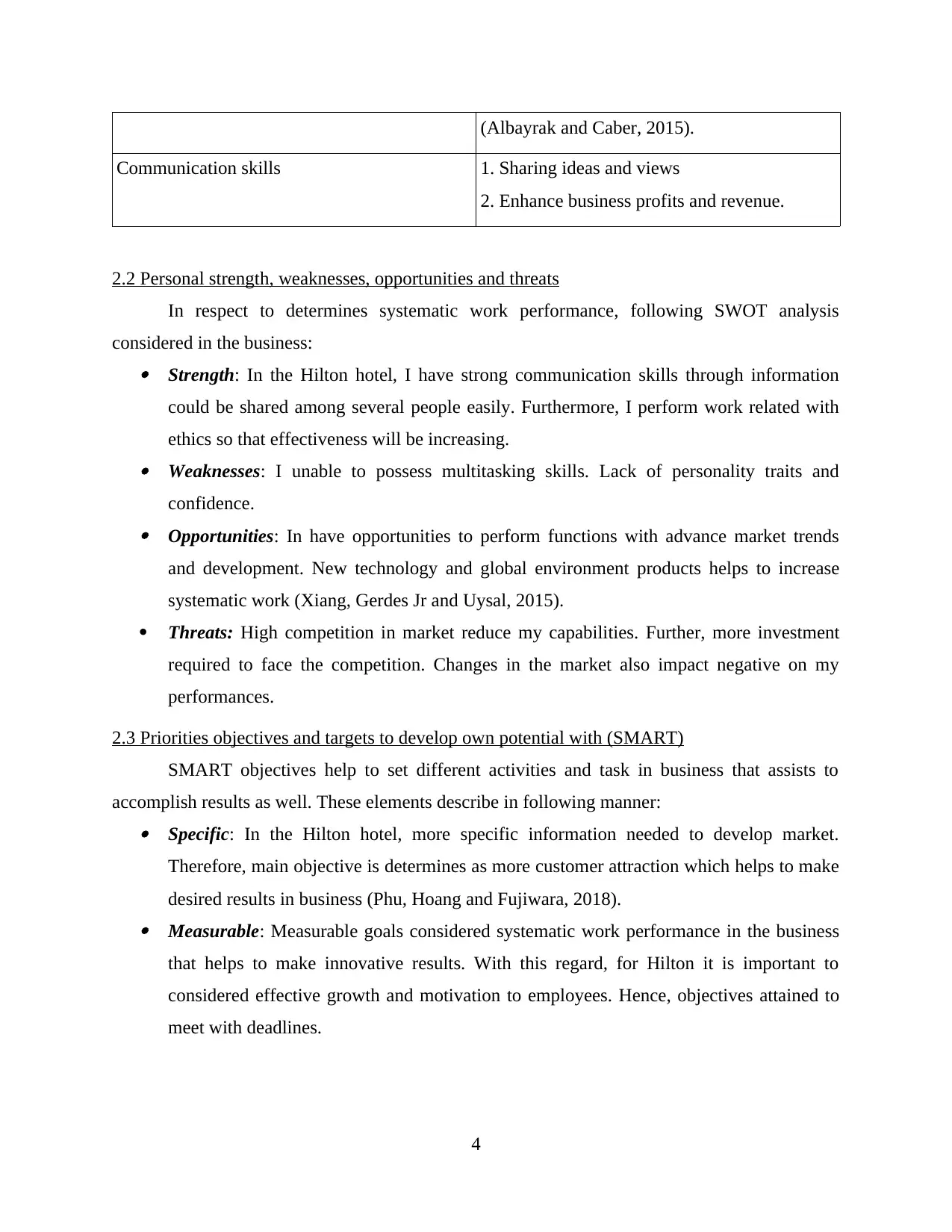
(Albayrak and Caber, 2015).
Communication skills 1. Sharing ideas and views
2. Enhance business profits and revenue.
2.2 Personal strength, weaknesses, opportunities and threats
In respect to determines systematic work performance, following SWOT analysis
considered in the business: Strength: In the Hilton hotel, I have strong communication skills through information
could be shared among several people easily. Furthermore, I perform work related with
ethics so that effectiveness will be increasing. Weaknesses: I unable to possess multitasking skills. Lack of personality traits and
confidence. Opportunities: In have opportunities to perform functions with advance market trends
and development. New technology and global environment products helps to increase
systematic work (Xiang, Gerdes Jr and Uysal, 2015).
Threats: High competition in market reduce my capabilities. Further, more investment
required to face the competition. Changes in the market also impact negative on my
performances.
2.3 Priorities objectives and targets to develop own potential with (SMART)
SMART objectives help to set different activities and task in business that assists to
accomplish results as well. These elements describe in following manner: Specific: In the Hilton hotel, more specific information needed to develop market.
Therefore, main objective is determines as more customer attraction which helps to make
desired results in business (Phu, Hoang and Fujiwara, 2018). Measurable: Measurable goals considered systematic work performance in the business
that helps to make innovative results. With this regard, for Hilton it is important to
considered effective growth and motivation to employees. Hence, objectives attained to
meet with deadlines.
4
Communication skills 1. Sharing ideas and views
2. Enhance business profits and revenue.
2.2 Personal strength, weaknesses, opportunities and threats
In respect to determines systematic work performance, following SWOT analysis
considered in the business: Strength: In the Hilton hotel, I have strong communication skills through information
could be shared among several people easily. Furthermore, I perform work related with
ethics so that effectiveness will be increasing. Weaknesses: I unable to possess multitasking skills. Lack of personality traits and
confidence. Opportunities: In have opportunities to perform functions with advance market trends
and development. New technology and global environment products helps to increase
systematic work (Xiang, Gerdes Jr and Uysal, 2015).
Threats: High competition in market reduce my capabilities. Further, more investment
required to face the competition. Changes in the market also impact negative on my
performances.
2.3 Priorities objectives and targets to develop own potential with (SMART)
SMART objectives help to set different activities and task in business that assists to
accomplish results as well. These elements describe in following manner: Specific: In the Hilton hotel, more specific information needed to develop market.
Therefore, main objective is determines as more customer attraction which helps to make
desired results in business (Phu, Hoang and Fujiwara, 2018). Measurable: Measurable goals considered systematic work performance in the business
that helps to make innovative results. With this regard, for Hilton it is important to
considered effective growth and motivation to employees. Hence, objectives attained to
meet with deadlines.
4
Paraphrase This Document
Need a fresh take? Get an instant paraphrase of this document with our AI Paraphraser
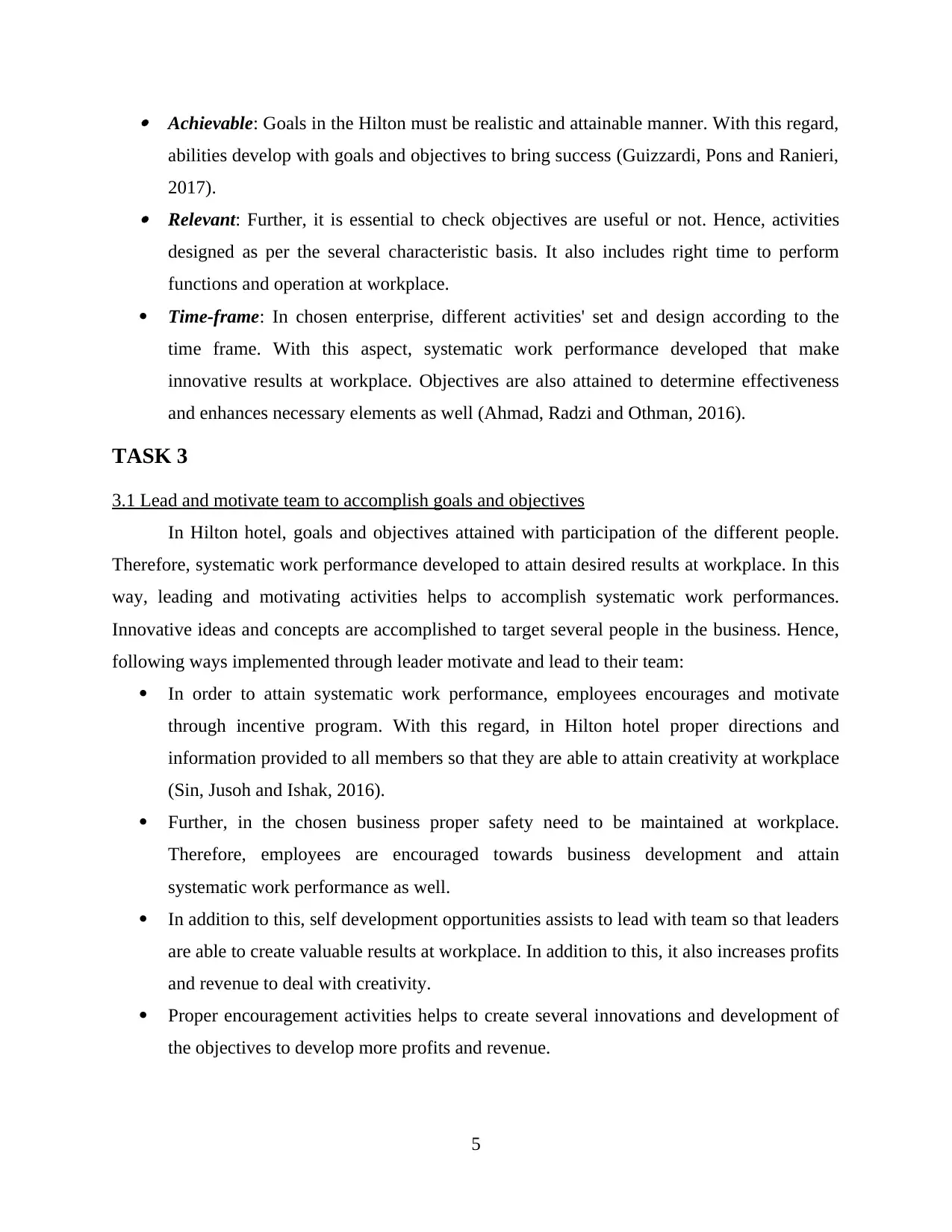
Achievable: Goals in the Hilton must be realistic and attainable manner. With this regard,
abilities develop with goals and objectives to bring success (Guizzardi, Pons and Ranieri,
2017). Relevant: Further, it is essential to check objectives are useful or not. Hence, activities
designed as per the several characteristic basis. It also includes right time to perform
functions and operation at workplace.
Time-frame: In chosen enterprise, different activities' set and design according to the
time frame. With this aspect, systematic work performance developed that make
innovative results at workplace. Objectives are also attained to determine effectiveness
and enhances necessary elements as well (Ahmad, Radzi and Othman, 2016).
TASK 3
3.1 Lead and motivate team to accomplish goals and objectives
In Hilton hotel, goals and objectives attained with participation of the different people.
Therefore, systematic work performance developed to attain desired results at workplace. In this
way, leading and motivating activities helps to accomplish systematic work performances.
Innovative ideas and concepts are accomplished to target several people in the business. Hence,
following ways implemented through leader motivate and lead to their team:
In order to attain systematic work performance, employees encourages and motivate
through incentive program. With this regard, in Hilton hotel proper directions and
information provided to all members so that they are able to attain creativity at workplace
(Sin, Jusoh and Ishak, 2016).
Further, in the chosen business proper safety need to be maintained at workplace.
Therefore, employees are encouraged towards business development and attain
systematic work performance as well.
In addition to this, self development opportunities assists to lead with team so that leaders
are able to create valuable results at workplace. In addition to this, it also increases profits
and revenue to deal with creativity.
Proper encouragement activities helps to create several innovations and development of
the objectives to develop more profits and revenue.
5
abilities develop with goals and objectives to bring success (Guizzardi, Pons and Ranieri,
2017). Relevant: Further, it is essential to check objectives are useful or not. Hence, activities
designed as per the several characteristic basis. It also includes right time to perform
functions and operation at workplace.
Time-frame: In chosen enterprise, different activities' set and design according to the
time frame. With this aspect, systematic work performance developed that make
innovative results at workplace. Objectives are also attained to determine effectiveness
and enhances necessary elements as well (Ahmad, Radzi and Othman, 2016).
TASK 3
3.1 Lead and motivate team to accomplish goals and objectives
In Hilton hotel, goals and objectives attained with participation of the different people.
Therefore, systematic work performance developed to attain desired results at workplace. In this
way, leading and motivating activities helps to accomplish systematic work performances.
Innovative ideas and concepts are accomplished to target several people in the business. Hence,
following ways implemented through leader motivate and lead to their team:
In order to attain systematic work performance, employees encourages and motivate
through incentive program. With this regard, in Hilton hotel proper directions and
information provided to all members so that they are able to attain creativity at workplace
(Sin, Jusoh and Ishak, 2016).
Further, in the chosen business proper safety need to be maintained at workplace.
Therefore, employees are encouraged towards business development and attain
systematic work performance as well.
In addition to this, self development opportunities assists to lead with team so that leaders
are able to create valuable results at workplace. In addition to this, it also increases profits
and revenue to deal with creativity.
Proper encouragement activities helps to create several innovations and development of
the objectives to develop more profits and revenue.
5
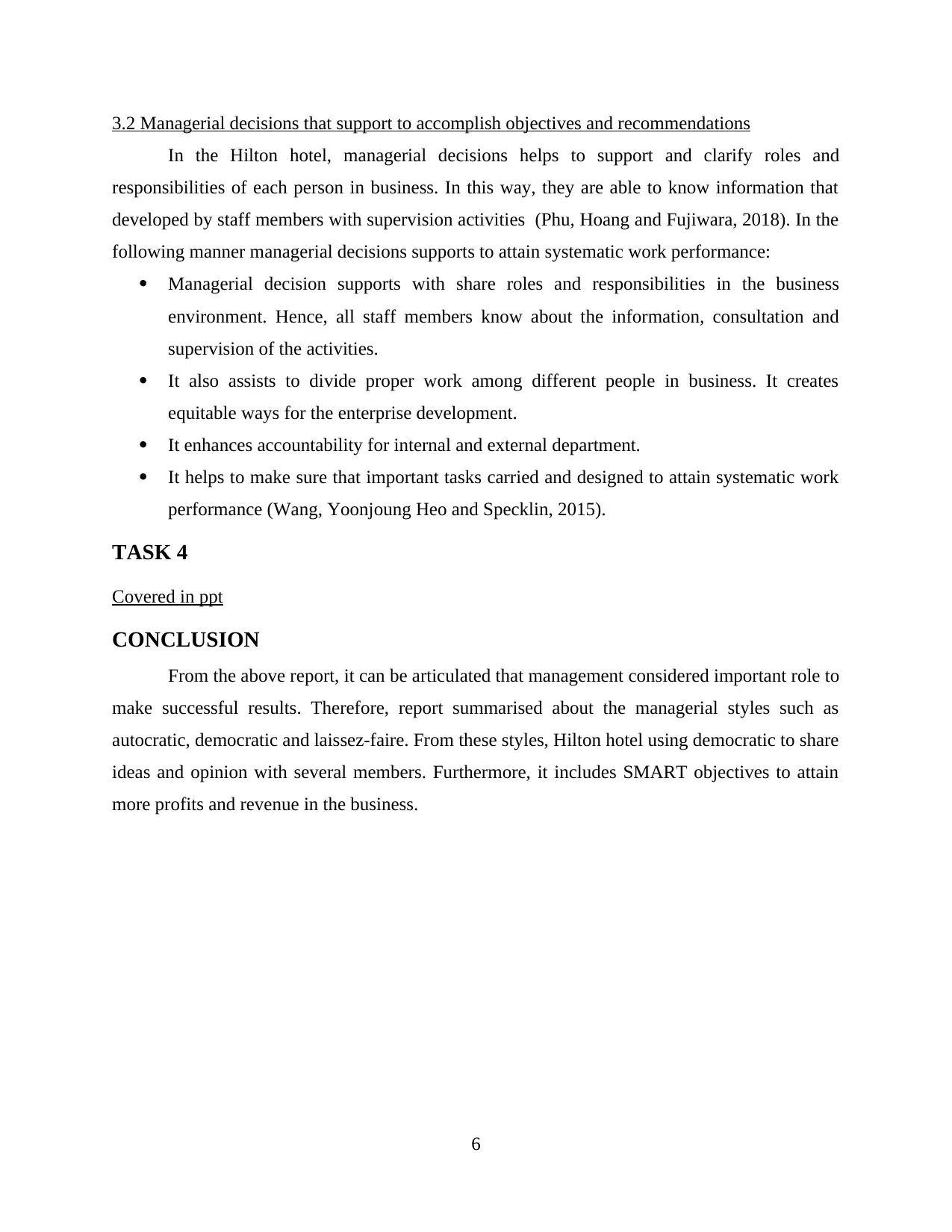
3.2 Managerial decisions that support to accomplish objectives and recommendations
In the Hilton hotel, managerial decisions helps to support and clarify roles and
responsibilities of each person in business. In this way, they are able to know information that
developed by staff members with supervision activities (Phu, Hoang and Fujiwara, 2018). In the
following manner managerial decisions supports to attain systematic work performance:
Managerial decision supports with share roles and responsibilities in the business
environment. Hence, all staff members know about the information, consultation and
supervision of the activities.
It also assists to divide proper work among different people in business. It creates
equitable ways for the enterprise development.
It enhances accountability for internal and external department.
It helps to make sure that important tasks carried and designed to attain systematic work
performance (Wang, Yoonjoung Heo and Specklin, 2015).
TASK 4
Covered in ppt
CONCLUSION
From the above report, it can be articulated that management considered important role to
make successful results. Therefore, report summarised about the managerial styles such as
autocratic, democratic and laissez-faire. From these styles, Hilton hotel using democratic to share
ideas and opinion with several members. Furthermore, it includes SMART objectives to attain
more profits and revenue in the business.
6
In the Hilton hotel, managerial decisions helps to support and clarify roles and
responsibilities of each person in business. In this way, they are able to know information that
developed by staff members with supervision activities (Phu, Hoang and Fujiwara, 2018). In the
following manner managerial decisions supports to attain systematic work performance:
Managerial decision supports with share roles and responsibilities in the business
environment. Hence, all staff members know about the information, consultation and
supervision of the activities.
It also assists to divide proper work among different people in business. It creates
equitable ways for the enterprise development.
It enhances accountability for internal and external department.
It helps to make sure that important tasks carried and designed to attain systematic work
performance (Wang, Yoonjoung Heo and Specklin, 2015).
TASK 4
Covered in ppt
CONCLUSION
From the above report, it can be articulated that management considered important role to
make successful results. Therefore, report summarised about the managerial styles such as
autocratic, democratic and laissez-faire. From these styles, Hilton hotel using democratic to share
ideas and opinion with several members. Furthermore, it includes SMART objectives to attain
more profits and revenue in the business.
6
⊘ This is a preview!⊘
Do you want full access?
Subscribe today to unlock all pages.

Trusted by 1+ million students worldwide
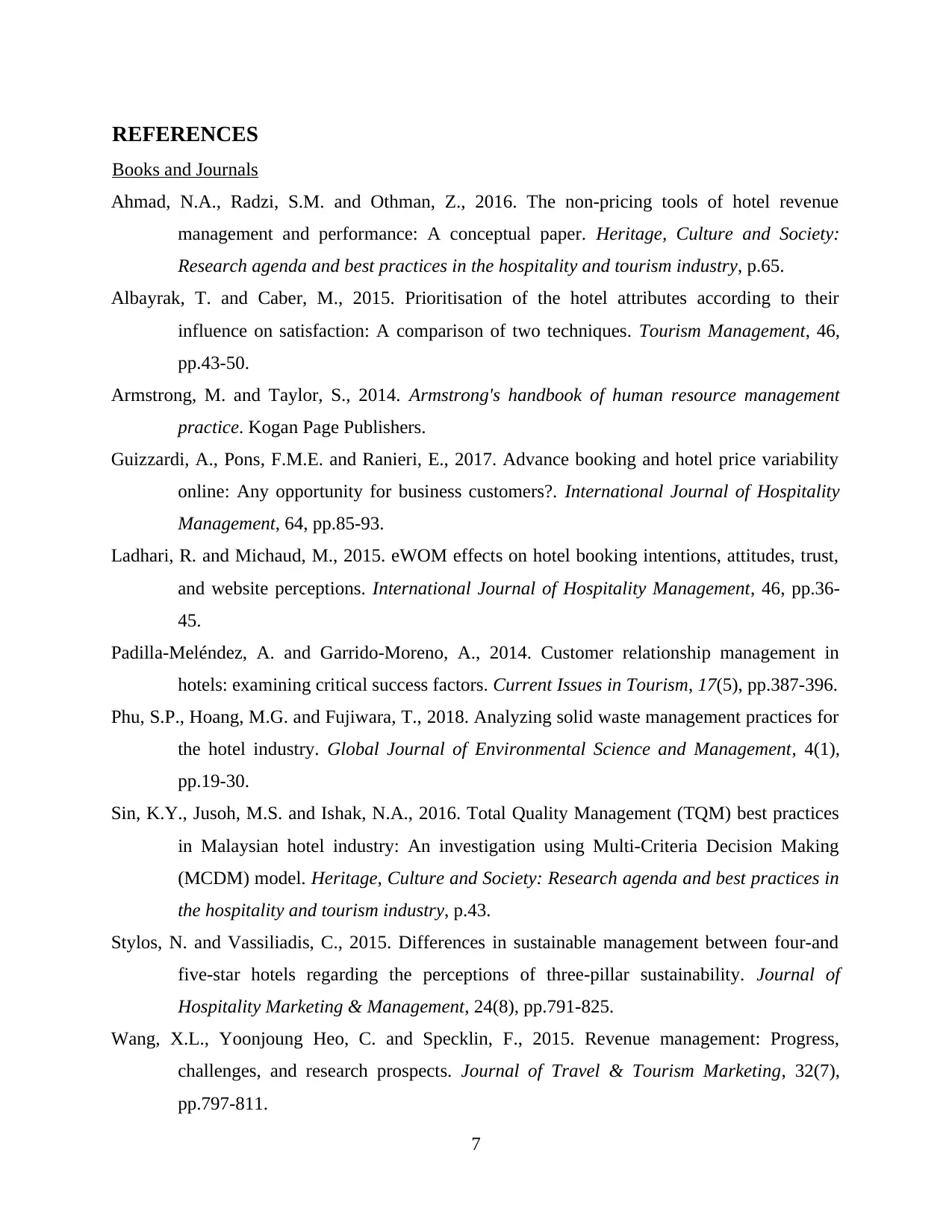
REFERENCES
Books and Journals
Ahmad, N.A., Radzi, S.M. and Othman, Z., 2016. The non-pricing tools of hotel revenue
management and performance: A conceptual paper. Heritage, Culture and Society:
Research agenda and best practices in the hospitality and tourism industry, p.65.
Albayrak, T. and Caber, M., 2015. Prioritisation of the hotel attributes according to their
influence on satisfaction: A comparison of two techniques. Tourism Management, 46,
pp.43-50.
Armstrong, M. and Taylor, S., 2014. Armstrong's handbook of human resource management
practice. Kogan Page Publishers.
Guizzardi, A., Pons, F.M.E. and Ranieri, E., 2017. Advance booking and hotel price variability
online: Any opportunity for business customers?. International Journal of Hospitality
Management, 64, pp.85-93.
Ladhari, R. and Michaud, M., 2015. eWOM effects on hotel booking intentions, attitudes, trust,
and website perceptions. International Journal of Hospitality Management, 46, pp.36-
45.
Padilla-Meléndez, A. and Garrido-Moreno, A., 2014. Customer relationship management in
hotels: examining critical success factors. Current Issues in Tourism, 17(5), pp.387-396.
Phu, S.P., Hoang, M.G. and Fujiwara, T., 2018. Analyzing solid waste management practices for
the hotel industry. Global Journal of Environmental Science and Management, 4(1),
pp.19-30.
Sin, K.Y., Jusoh, M.S. and Ishak, N.A., 2016. Total Quality Management (TQM) best practices
in Malaysian hotel industry: An investigation using Multi-Criteria Decision Making
(MCDM) model. Heritage, Culture and Society: Research agenda and best practices in
the hospitality and tourism industry, p.43.
Stylos, N. and Vassiliadis, C., 2015. Differences in sustainable management between four-and
five-star hotels regarding the perceptions of three-pillar sustainability. Journal of
Hospitality Marketing & Management, 24(8), pp.791-825.
Wang, X.L., Yoonjoung Heo, C. and Specklin, F., 2015. Revenue management: Progress,
challenges, and research prospects. Journal of Travel & Tourism Marketing, 32(7),
pp.797-811.
7
Books and Journals
Ahmad, N.A., Radzi, S.M. and Othman, Z., 2016. The non-pricing tools of hotel revenue
management and performance: A conceptual paper. Heritage, Culture and Society:
Research agenda and best practices in the hospitality and tourism industry, p.65.
Albayrak, T. and Caber, M., 2015. Prioritisation of the hotel attributes according to their
influence on satisfaction: A comparison of two techniques. Tourism Management, 46,
pp.43-50.
Armstrong, M. and Taylor, S., 2014. Armstrong's handbook of human resource management
practice. Kogan Page Publishers.
Guizzardi, A., Pons, F.M.E. and Ranieri, E., 2017. Advance booking and hotel price variability
online: Any opportunity for business customers?. International Journal of Hospitality
Management, 64, pp.85-93.
Ladhari, R. and Michaud, M., 2015. eWOM effects on hotel booking intentions, attitudes, trust,
and website perceptions. International Journal of Hospitality Management, 46, pp.36-
45.
Padilla-Meléndez, A. and Garrido-Moreno, A., 2014. Customer relationship management in
hotels: examining critical success factors. Current Issues in Tourism, 17(5), pp.387-396.
Phu, S.P., Hoang, M.G. and Fujiwara, T., 2018. Analyzing solid waste management practices for
the hotel industry. Global Journal of Environmental Science and Management, 4(1),
pp.19-30.
Sin, K.Y., Jusoh, M.S. and Ishak, N.A., 2016. Total Quality Management (TQM) best practices
in Malaysian hotel industry: An investigation using Multi-Criteria Decision Making
(MCDM) model. Heritage, Culture and Society: Research agenda and best practices in
the hospitality and tourism industry, p.43.
Stylos, N. and Vassiliadis, C., 2015. Differences in sustainable management between four-and
five-star hotels regarding the perceptions of three-pillar sustainability. Journal of
Hospitality Marketing & Management, 24(8), pp.791-825.
Wang, X.L., Yoonjoung Heo, C. and Specklin, F., 2015. Revenue management: Progress,
challenges, and research prospects. Journal of Travel & Tourism Marketing, 32(7),
pp.797-811.
7
Paraphrase This Document
Need a fresh take? Get an instant paraphrase of this document with our AI Paraphraser
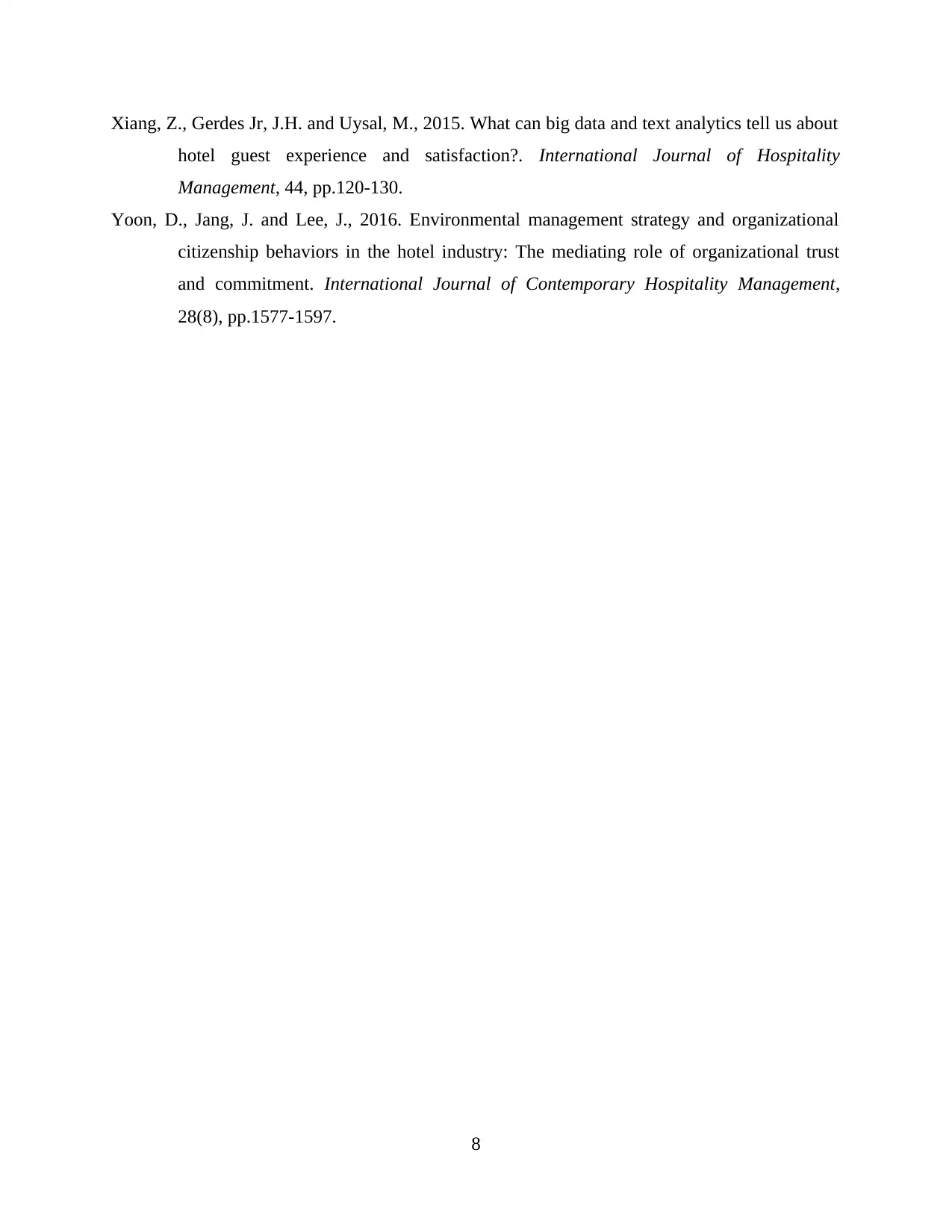
Xiang, Z., Gerdes Jr, J.H. and Uysal, M., 2015. What can big data and text analytics tell us about
hotel guest experience and satisfaction?. International Journal of Hospitality
Management, 44, pp.120-130.
Yoon, D., Jang, J. and Lee, J., 2016. Environmental management strategy and organizational
citizenship behaviors in the hotel industry: The mediating role of organizational trust
and commitment. International Journal of Contemporary Hospitality Management,
28(8), pp.1577-1597.
8
hotel guest experience and satisfaction?. International Journal of Hospitality
Management, 44, pp.120-130.
Yoon, D., Jang, J. and Lee, J., 2016. Environmental management strategy and organizational
citizenship behaviors in the hotel industry: The mediating role of organizational trust
and commitment. International Journal of Contemporary Hospitality Management,
28(8), pp.1577-1597.
8
1 out of 11
Related Documents
Your All-in-One AI-Powered Toolkit for Academic Success.
+13062052269
info@desklib.com
Available 24*7 on WhatsApp / Email
![[object Object]](/_next/static/media/star-bottom.7253800d.svg)
Unlock your academic potential
Copyright © 2020–2026 A2Z Services. All Rights Reserved. Developed and managed by ZUCOL.





